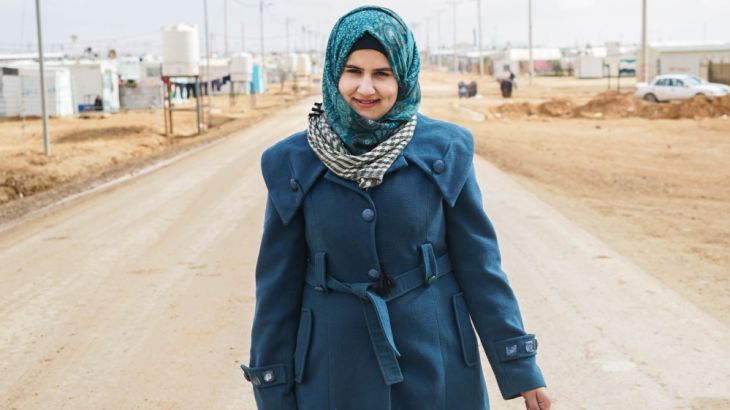Syria’s war: Teenagers share stories from Zaatari refugee camp
Al Jazeera documents life of Syrian teenagers living in Jordan’s Zaatari refugee camp.

Zaatari refugee camp, Jordan – Mahmoud fled Syria when he was nine, Najat when she was 11.
Like many other Syrian teenagers, both of them grew up far away from home.
Keep reading
list of 4 items‘Triple spending’: Zimbabweans bear cost of changing to new ZiG currency
‘We share with rats’: Neglect, empty promises for S African hostel-dwellers
Thirty years waiting for a house: South Africa’s ‘backyard’ dwellers
“7 Stories for 7 Years” is an immersive 360 documentary by Contrast VR – Al Jazeera’s immersive media studio – and World Vision.
Narrated by Liam Cunningham, from Game of Thrones, the documentary shows the interwoven stories of seven young Syrian teenagers living in Zaatari refugee camp in Jordan.
Contrast VR held a workshop with seven teenagers, teaching them how to create their first 360 videos.
Comprising intimate footage shot by the teenagers, this documentary takes viewers into their world as they share their hopes, dreams and challenges.
Mobile users click here to view the immersive 360 documentary
Past the security checkpoint at its entrance, Zaatari refugee camp becomes a vast and complex matrix of nameless streets, districts and zones.
Along the bustling main road, nicknamed Champs-Elysees, pedestrians try and dodge the endless stream of young men on dusty bicycles, carts piled with vegetables, and the occasional car that belongs to an NGO.
A bright and colourful storefront showcases a vast array of wedding dresses. The next one emits the smoke and waft of a fresh shawarma.
A bunch of teenagers pass by the vibrant murals that decorate the walls on both sides of the streets. These are a new generation of Syrians who have grown up in NGO-sanctioned caravans.
![Yousef (left), 16, with his older brother, Ali, who became a barber in the camp [Joi Lee/Contrast VR]](/wp-content/uploads/2018/03/0ad25a979ecf4d09afbd6d04dd935940_18.jpeg)
Since its establishment in 2012, the camp, located in Jordan’s northeast, has become a sprawling city that houses around 80,000 Syrian refugees – down from 150,000 that it housed during its peak.
Those who remain in the camp have settled into their lives, expanding their family compounds one caravan at a time, building their businesses and raising their children.
“I was young when we fled,” said 15-year-old Mahmoud, who has been living in this camp for five years.
“My father said we lived a normal life in Syria. I wish I could remember it.”
Their description of school, extracurricular activities and workshops were interlaced with mentions of various NGOs.
They are also no strangers to media. Obada, 15, has an older brother working as a fixer in the camp for a news organisation.
Marah, an 18-year-old mother, has already participated in a photography and film workshop.
“When I first arrived at the camp, I didn’t care about anything,” said Marah.
“Then, I heard about a photography course. I started to make my own movies about life in the camp.”
Having witnessed so many journalists in the camp, 16-year-old Tabarak has dreams of writing “stories about the whole world and becoming a famous journalist”.
The teenagers’ stories explore joys of football and theatre, their relationship with their siblings, and their dreams.
The stories they told were remarkably youthful, reminiscent of any other teenagers’ dreams and visions of the world.
![Nisreen (left), 16, and Marah, 18, learn how to film using the 360-degree camera [Joi Lee/Contrast VR]](/wp-content/uploads/2018/03/d61b3530ea1a418d8c6e1083c4ae76f9_18.jpeg)